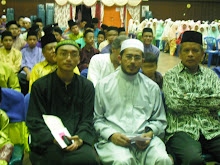The shadatain, which is the basic creed or tenet of Islam: 'ašhadu 'al-lā ilāha illā-llāhu wa 'ašhadu 'anna muħammadan rasūlu-llāh, or "I testify that there is none worthy of worship except God and I testify that Muhammad is the Messenger of God." As the most important pillar, this testament is a foundation for all other beliefs and practices in Islam. Muslims must repeat the shahadah in prayer, and non-Muslims wishing to convert to Islam are required to recite the creed.
Salah
Salah, or ritual prayer, which must be performed five times a day at fixed times. Each salah is performed facing towards the Kaaba in Mecca. Salah is intended to focus the mind on God; it is seen as a personal communication with God, expressing gratitude and worship. According to the Qur'an, the benefit of prayer "restrains [one] from shameful and evil deeds". Salah is compulsory but some flexibility in the specifics is allowed depending on the circumstances. In many Muslim countries, reminders called calls to prayer are broadcast publicly from local mosques at the appropriate times. The prayers themselves are recited in the Arabic language, and consist of quotes from the Qur'an.

Muslims who seek for His forgiveness are none other than like these chaste children
Zakat
Zakat, or alms-giving. This is the practice of charitable giving by Muslims based on accumulated wealth, and is obligatory for all who are able to do so. It consists of spending a fixed portion of one's wealth for the benefit of the poor or needy, including slaves, debtors, travelers, and others. A Muslim may also donate more as an act of voluntary charity (sadaqah), in order to achieve additional divine reward. There are two main types of zakat — a zakat on "traffic", which is a fixed amount paid during the month of Ramadan, and the zakat on wealth, which covers money made in business, savings, income, and so on.
Sawm
Sawm, or fasting during the month of Ramadan. Muslims must abstain from food, drink, and sexual intercourse from dawn to dusk during this month, and are to be especially mindful of other sins. The fast is meant to allow Muslims to seek nearness to God, to express their gratitude to and dependence on him, to atone for their past sins, and to remind them of the needy. Sawm is not obligatory for several groups for whom it would be excessively problematic. For others, flexibility is allowed depending on circumstances, but missing fasts usually must be made up soon afterwards.
The Hajj
The Hajj, which is the pilgrimage that occurs during the Islamic month of Dhu al-Hijjah in the city of Mecca. Every able-bodied Muslim who can afford to do so is obliged to make the pilgrimage to Mecca at least once in his or her lifetime. When the pilgrim is around ten kilometers from Mecca, he must dress in Ihram clothing, which consists of two white unhemmed sheets. Rituals of the Hajj include walking seven times around the Kaaba, touching the Black Stone, running seven times between Mount Safa and Mount Marwah, and symbolically stoning the Devil in Mina. The pilgrim, or the hajji, is honored in his or her community, although Islamic teachers say that the Hajj should be an expression of devotion to God, not a means to gain social standing.

































No comments:
Post a Comment
thank you for all the testimonials, insyaAllah there will be correction for some mistakes in the articles...